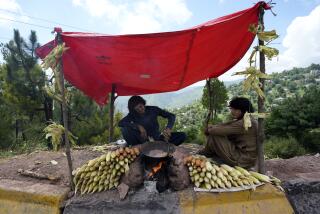Pakistan’s Needs Run Deep
- Share via
Running top U.S. officials in and out of Pakistan to show support for its president, Gen. Pervez Musharraf, is smart, but it’s not enough. Washington and its allies must now bolster this impoverished nation’s economy so that the moderate majority of Pakistanis remains immune to the allure of the raucous few--fundamentalists who cannot forgive Musharraf for turning against the fanatical Taliban rulers in neighboring Afghanistan.
One good move would be for the more than a dozen industrialized nations known as the Paris Club to extend payment deadlines on loans made to Pakistan. The nation owes nearly $40 billion to foreign countries, an amount that requires it to pay out more than 50% of its budget revenues just to keep up. Japan is owed $5 billion, the U.S. $3 billion and other countries significant sums as well.
The country got into such fiscal straits primarily because it spent too much in its arms race with its unfriendly neighbor, India. Several Pakistani officials have said recently that they recognize the need to channel money away from the military and defense and into schools, health and programs to help the unemployed.
Pakistan’s main export is cloth and clothing. The European Commission recently eased trade barriers on Pakistani textiles, a helpful action, though one that upset competitors in Portugal, Greece and Spain. U.S. textile makers too have objected to any easing of tariffs on exports to this country. But there must be an accommodation.
The war so far has disrupted few of the plants where Pakistanis make shirts, slacks and even U.S. flags. But worries that manufacturers will eventually be put out of business have prompted some companies to delay orders. It’s up to private companies to decide whether to buy from Pakistan, but for the U.S. to reduce tariffs and allow more imports would boost the economy of a nation that is a key partner in the anti-terror coalition.
Musharraf, who seized power in a coup two years ago, cast his lot with Washington soon after the Sept. 11 attacks. Since then, he has purged top military leaders considered too sympathetic to the Taliban. Even before the attacks, he promised to restore civilian rule by next October. With Islamic political parties in open rebellion against his support of the U.S. bombing of Afghanistan, Musharraf will have a hard time meeting that deadline. But he needs to continue in that direction, and the West has a big stake in supporting Pakistan’s move back toward democracy, in part because an open society would undermine the repressive impulses of Islamic fundamentalism. Financial aid would help Pakistan on its steep climb out of poverty and toward political stability.
More to Read
Sign up for Essential California
The most important California stories and recommendations in your inbox every morning.
You may occasionally receive promotional content from the Los Angeles Times.













